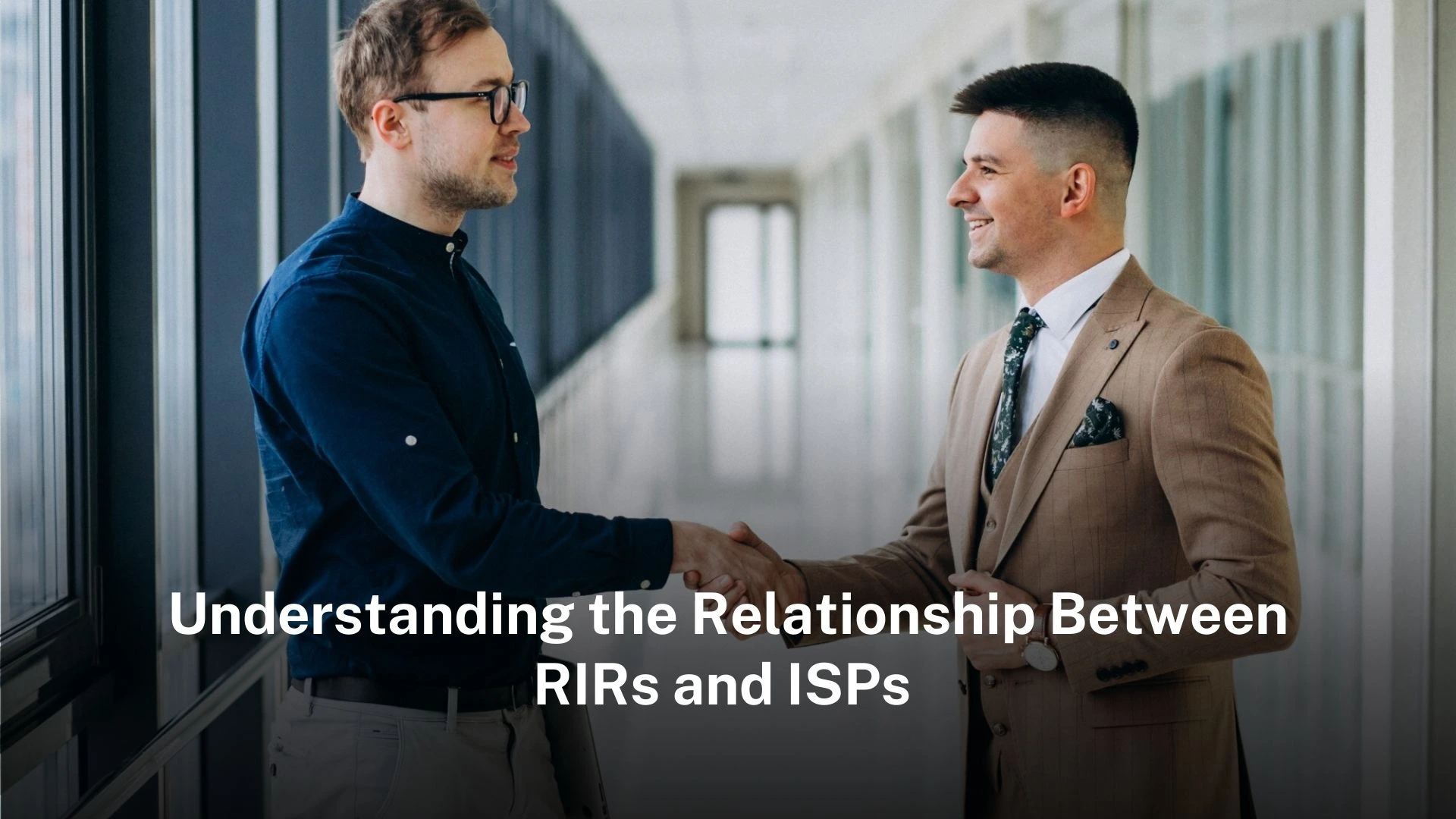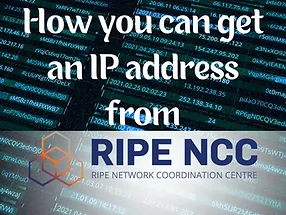Regional Internet Registries (RIRs) and Internet Service Providers (ISPs) are the main and vital parts of global IP address management. RIRs give out IPs and keep records of who owns them. They make sure the addresses are shared in a fair way and that the information is correct.
Table of Contents
ToggleISPs get the addresses from RIRs and give internet access to people and companies. They use the addresses to connect users to the network and follow the rules from the RIRs.
RIRs keep the system organised and stop problems like duplicate or fake addresses. ISPs use the addresses to run their networks and make sure users could reach websites and services. Both play crucial roles and their work is linked closely.
Introduction
When you load one webpage, stream a video, or send an email, you do not think about the system that makes it work. At the core of these system are IP addresses. These are unique and special numbers that let devices talk to each other through the internet. RIRs manage these addresses and make sure they are given out in a fair and safe way. ISPs take the addresses from RIRs and use them to connect people to the internet. RIRs keep records and make sure there is no confusion about who uses which address. ISPs give the service so users can go online and use websites, videos, and messages. Both do different jobs but work together to keep the internet stable.
What are RIRs and ISPs?
RIRs are groups that do not make a profit. They give out IP address space and Autonomous System Numbers in set parts of the world. There are five RIRs. AFRINIC works in Africa. APNIC works in the Asia Pacific area. ARIN works in North America. LACNIC works in Latin America and the Caribbean.
RIPE NCC works in Europe, the Middle East, and some parts of Central Asia. These groups make sure the addresses and numbers are given in a fair way and are recorded so people know who is using them.Each RIR works on its own. They follow the same global rules so things stay the same in every place. They also make rules that fit their own region.
ISPs are companies that give internet access to people, businesses, and groups. They get IP addresses from their RIR. They use these addresses to give to customer devices. They also use them to keep routing tables and make sure the internet address system works and stays correct.
The policy development journey: from proposal to address block
The Policy Development Process is a key part of how RIRs work. This process is open to everyone and lets many people take part. It makes sure that the rules for internet number use are not made only by the RIR staff or board. They are also made by people and groups who need these resources. Anyone can give a proposal for a new rule or a change to an old one. The proposal is then shared with the community. People can talk about it and give their ideas. If the community agrees, the rule is accepted. After that, the RIR can start using the new rule when giving out IP address blocks.
In practice, the process works in clear steps. First is the proposal stage. Any person from the community, such as an ISP engineer, a government ICT worker, or a researcher, can write a new policy idea. Next is the discussion stage. The idea is shared on public mailing lists and in open forums. People are invited to give feedback. The talks can be very technical or sometimes political. Then comes the revision stage. The person who wrote the idea can make changes based on what others say. They may change it many times to get more people to agree. After that is the consensus stage. The chairs of the policy groups check if most people agree and there is no strong pushback. Last is the board check. The RIR board looks at the decision to make sure it fits the rules and laws before it is used.
This structure makes sure that policies are made from the bottom up, are open for everyone to see, and match the needs of each region. It is not quick and can take many months or even years for some ideas to be finished. This slow pace helps people trust the process. RIPE NCC says that including everyone is important because policies touch every network operator and also every internet user.
Why the RIR–ISP relationship is crucial
The relationship between RIRs and ISPs is a partnership where both sides depend on each other. RIRs work on a large scale and make sure the giving of IP resources is fair and can be tracked across the whole region. ISPs work on a small scale and make sure these resources go to the people who use the internet. Without RIR control, ISPs could give themselves addresses, but this could cause duplication, routing problems, and security risks. Without ISPs using the allocations, the address blocks would stay in databases and not help real communication happen.
For example, when an ISP gets a /20 IPv4 block, which is 4,096 addresses, it must keep records in the RIR database. It must set up routing so traffic to these addresses goes to the right place. It must deal with reports if the addresses are used in the wrong way. RIR databases must be correct because an old or wrong record can slow down fixing problems or can send network blocks to the wrong place during security events.
Operational collaboration
RIRs and ISPs work together in many ways. ISPs keep their allocation records correct in RIR databases so routing works well and problems can be fixed fast. Many ISPs use RPKI to check if routes are real. RIRs promote this to stop route hijacking. RIRs also give training to ISP technical teams on IPv6 setup, routing safety, and how to follow policy. These activities help both sides keep the internet stable and safe.
Challenges on the horizon
IPv4 addresses are running out and ASNs, especially old 16-bit ASNs, are also becoming fewer, though 32-bit ASNs are still more available. IPv4 brokers can make trading faster but can also lead to speculation, higher prices, and less fair access. Routing is less safe when RPKI is not used everywhere, which makes it easier for bad actors to make false route announcements. Political issues like disputes over control, sanctions, and local data laws can affect how RIRs and ISPs work together. New technology like IoT and 5G needs more flexible IP use, which is speeding up the move to IPv6.
RIPE NCC and ISP collaboration
In Europe and the Middle East, RIPE NCC uses a Local Internet Registry membership model that shows how organised cooperation works. Each ISP becomes a member and pays a yearly fee. The ISP then gets access to IP resources and can take part in the policy process. This setup keeps the community involved and helps make sure the policies match real-world needs. Members can join discussions, vote on proposals, and share technical feedback.
The way RIRs and ISPs work together to run the internet
The relationship between RIRs and ISPs is a steady force that helps keep the internet working. It makes sure that resources are given out in a fair way, that records are correct, and that the use of these resources follows the rules. IPv4 addresses are running out, and the use of IPv6 is still not the same in all places, so this partnership is becoming more important. RIRs and ISPs work together in many areas, from creating rules in public meetings to taking part in projects that make routing safer. They share the job of making sure the internet stays working, strong, and available to people everywhere.
FAQs
What is the main role of an RIR?
The main role of an RIR is to give out and manage IP addresses and ASNs in its region and keep public records correct.Why do ISPs need RIRs?
ISPs need RIRs because without them there could be address duplication and routing problems that could break network stability.What happens when IPv4 runs out?
When IPv4 runs out ISPs use IPv4 transfers and start moving to IPv6 to meet the need for more addresses.Are all ISPs required to use IPv6 now?
No. Some ISPs use IPv6 while others still rely on IPv4, and many run both so they can serve all customCan individuals interact with an RIR?
Yes. Anyone can join policy talks but getting resources usually happens through an ISP or LIR.





Your blog is a treasure trove of valuable insights and thought-provoking commentary. Your dedication to your craft is evident in every word you write. Keep up the fantastic work!
I just could not depart your web site prior to suggesting that I really loved the usual info an individual supply in your visitors Is gonna be back regularly to check up on new posts
Your blog has become an indispensable resource for me. I’m always excited to see what new insights you have to offer. Thank you for consistently delivering top-notch content!
Wow amazing blog layout How long have you been blogging for you made blogging look easy The overall look of your web site is magnificent as well as the content
Your writing is like a breath of fresh air in the often stale world of online content. Your unique perspective and engaging style set you apart from the crowd. Thank you for sharing your talents with us.
Your writing is like a breath of fresh air in the often stale world of online content. Your unique perspective and engaging style set you apart from the crowd. Thank you for sharing your talents with us.
I’ve been following your blog for quite some time now, and I’m continually impressed by the quality of your content. Your ability to blend information with entertainment is truly commendable.
Your blog is a breath of fresh air in the often stagnant world of online content. Your thoughtful analysis and insightful commentary never fail to leave a lasting impression. Thank you for sharing your wisdom with us.
I just could not depart your web site prior to suggesting that I really loved the usual info an individual supply in your visitors Is gonna be back regularly to check up on new posts
you are in reality a good webmaster The website loading velocity is amazing It sort of feels that youre doing any distinctive trick Also The contents are masterwork you have done a fantastic job in this topic
I just could not depart your web site prior to suggesting that I really loved the usual info an individual supply in your visitors Is gonna be back regularly to check up on new posts
Its like you read my mind You appear to know a lot about this like you wrote the book in it or something I think that you could do with some pics to drive the message home a little bit but instead of that this is fantastic blog An excellent read I will certainly be back
Just wish to say your article is as surprising The clearness in your post is just cool and i could assume youre an expert on this subject Fine with your permission allow me to grab your RSS feed to keep updated with forthcoming post Thanks a million and please keep up the enjoyable work
Your blog is a testament to your dedication to your craft. Your commitment to excellence is evident in every aspect of your writing. Thank you for being such a positive influence in the online community.
I loved as much as you will receive carried out right here The sketch is attractive your authored material stylish nonetheless you command get got an impatience over that you wish be delivering the following unwell unquestionably come more formerly again since exactly the same nearly a lot often inside case you shield this hike
you are in reality a just right webmaster The site loading velocity is incredible It seems that you are doing any unique trick In addition The contents are masterwork you have performed a wonderful task on this topic
Your blog is a testament to your dedication to your craft. Your commitment to excellence is evident in every aspect of your writing. Thank you for being such a positive influence in the online community.
Awesome! Its truly remarkable paragraph, I have got much clear idea concernbing from this article.
Your blog has quickly become one of my favorites. Your writing is both insightful and thought-provoking, and I always come away from your posts feeling inspired. Keep up the phenomenal work!
Your writing is not only informative but also incredibly inspiring. You have a knack for sparking curiosity and encouraging critical thinking. Thank you for being such a positive influence!
I was suggested this web site by my cousin Im not sure whether this post is written by him as no one else know such detailed about my trouble You are incredible Thanks
Every time I visit your website, I’m greeted with thought-provoking content and impeccable writing. You truly have a gift for articulating complex ideas in a clear and engaging manner.
Wow wonderful blog layout How long have you been blogging for you make blogging look easy The overall look of your site is great as well as the content
Your blog is a treasure trove of valuable insights and thought-provoking commentary. Your dedication to your craft is evident in every word you write. Keep up the fantastic work!
Your writing is like a breath of fresh air in the often stale world of online content. Your unique perspective and engaging style set you apart from the crowd. Thank you for sharing your talents with us.